One of the biggest misconceptions about plant-based milk is that it doesn’t have enough calcium.
However, that’s not entirely true. You don’t have to sacrifice your calcium intake to drink non-dairy milk.
Read on to find out which plant-based milk you should buy to add more calcium to your diet.
Where Does Calcium in Non-Dairy Milk Come From?
Most plant-based milk doesn’t naturally contain calcium—not in significant amounts, at least.
If you look at the ingredients and nutrition label on the back of plant-based milk made with clean ingredients, you’ll notice that it has little to no calcium.
For instance, here are the nutrition facts for Elmhurst Almond Milk, which has some of the cleanest ingredients of any plant-based milk—filtered water and almonds
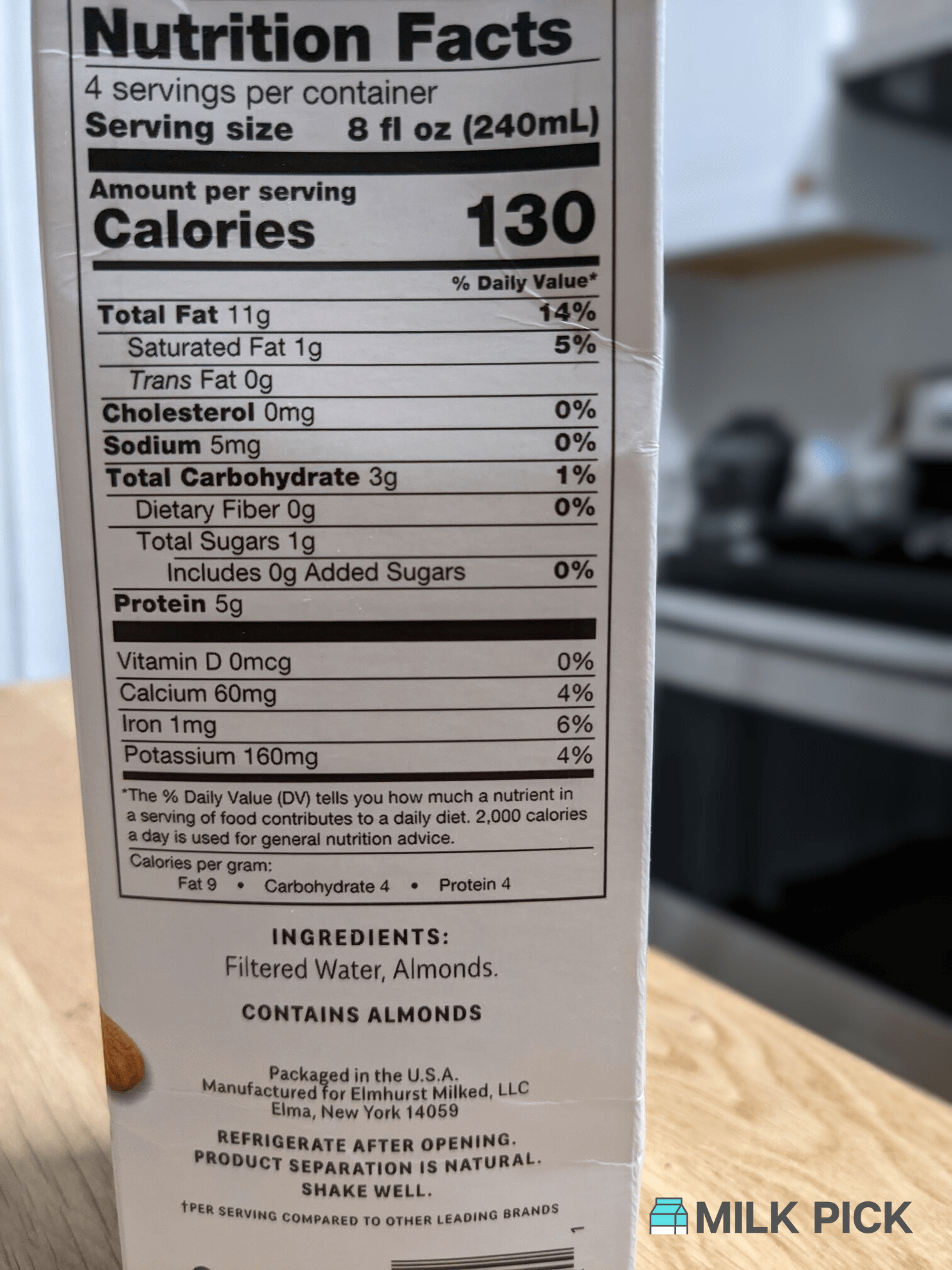
The calcium in plant-based milk is added during the manufacturing process. The process of adding additional nutrients to milk is called fortification.
Here’s a short video from Calla Chapin, RDN, that explains more about milk fortification. The video is about dairy milk, but the process is the same for plant-based milk.
While we prefer simple ingredients when possible, the reality is without being fortified, plant-based milk lacks some essential nutrients.
However, if you get calcium (and other nutrients) from other sources, you don’t need to use fortified milk.
Calcium Needs Vitamin D
Another thing to remember is that your body needs vitamin D to absorb calcium.
That’s why milk fortified with calcium is often fortified with vitamin D. It’s also why dairy milk is fortified with vitamin D.
Unlike plant-based milk, dairy milk contains natural calcium (about 20% of the recommended daily value). But as we mentioned, your body can’t absorb calcium without vitamin D.
So even if your milk is fortified with calcium, you need to get an adequate amount of vitamin D in your diet. Unfortunately, roughly 42% of the population is vitamin D deficient.
You’ll likely need to take supplements to get the recommended amount of vitamin D.
Here’s how much vitamin D you need per day, according to the National Institutes of Health.
Age | Male | Female |
|---|---|---|
0-12 months | 10 mcg | 10 mcg |
1-13 years | 15 mcg | 15 mcg |
14-18 years | 15 mcg | 15 mcg |
19-50 years | 15 mcg | 15 mcg |
51-70 years | 15 mcg | 15 mcg |
>70 Years | 20 mcg | 20 mcg |
For comparison, plant-based milk fortified with vitamin D has about 10% of the recommended daily value.
So you’ll likely need to supplement with vitamins.
Consult your physician before taking any type of supplements.
Why We Don’t Recommend Most Fortified Plant-Based Milk
While plant-based milk fortified with calcium does give you some added nutrients, most brands also include several other additives that we try to steer clear of.
Specifically:
- Natural Flavors
- Gums
- Inflammatory oils
For instance, Silk is one of the most popular almond milk brands on the market, and it’s fortified with vitamin D, calcium, and other nutrients.
That’s great.
But things become questionable when you look at the rest of the ingredients.

In our opinion, you shouldn't have to consume “natural flavors” to get extra calcium from almond milk.
This leaves you with a couple of options:
- Make your own plant-based milk and fortify it yourself
- Buy not-so-bad plant-based milk fortified with calcium and vitamin D
While making your own plant-based milk is easier than ever, it’s more convenient to buy it from the grocery store.
Not to worry, though.
We’ve scoured the internet, looked at dozens of nutrition labels, and found some of the best plant-based milk options for calcium with minimal additives.
Best Plant-Based Milk For Calcium
Before we dive into the full list, I want to lay some ground rules. You’ll find a bunch of lists of the best plant-based milk for calcium.
However, those lists are based on milk packed with additives, preservatives, and low-quality ingredients. Our list considers the full ingredient list, not just the amount of calcium.
Our Criteria
Brand | Calcium | Type of Milk |
|---|---|---|
Kiki Milk | 228mg (18% DV) | Oats |
Mooala Unsweetened Coconut Oatmilk | 300mg (25% DV) | Oats |
Mooala Bananamilk | 300mg (25% DV) | Banana |
Mooala Unsweetened Almondmilk | 150mg (10% DV) | Almond |
Pacific Foods Organic Original Oat Milk | 121mg (10% DV) | Oats |
Pacific Foods Hemp Original | 263mg (20%) | Hemp |
Oatsome | 289mg (20%) | Oats |
1. Kiki Milk
Kiki milk is a blend of oats, hemp, pumpkin, banana, and other natural ingredients. It’s our top pick for plant-based milk with calcium.
It contains no oils, gums, natural flavors, or other additives. It’s sweetened with monk fruit and coconut sugar, which we haven’t seen in other plant-based milk.
On top of that, it has the best ingredients of any milk on this list and packs 18% of the recommended daily value of calcium naturally.
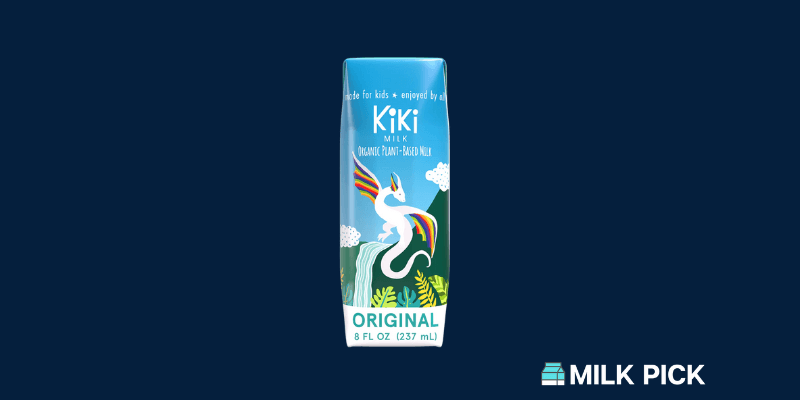
Calcium:
228mg (18% DV)
Ingredients:
Filtered water, Organic Oats, Organic Hemp Seeds, Organic Sprouted Pumpkin Seeds, Organic Coconuts, Organic Coconut Sugar, Organic Aquamin (Seaweed), Organic Bananas, Organic Amla, Sea Salt, Organic Monk Fruit
2. Mooala Unsweetened Coconut Oatmilk
Mooala has three types of milk on our list. We’re starting with their coconut oatmilk, which contains 25% of the recommended daily value of calcium!
The ingredients are about as clean as you can get for fortified plant-based milk, but it does contain gellan gum which is par for the course, unfortunately (except with Kiki).
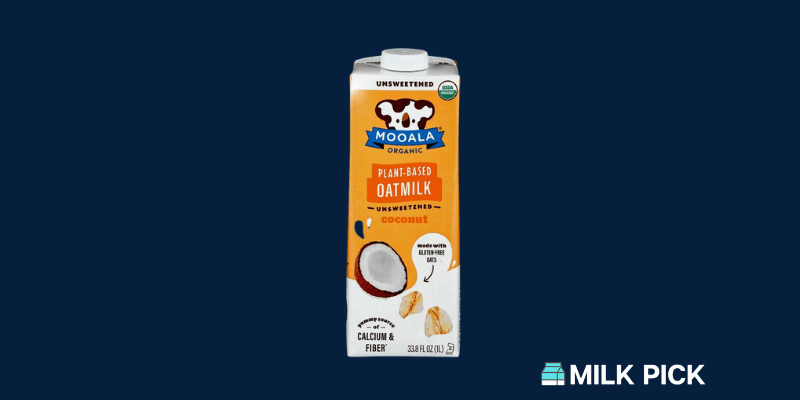
Calcium:
300mg (25% DV)
Ingredients:
Organic Gluten-Free Oatmilk (Filtered Water + Organic Oat Flour), Organic Coconut Cream, Less Than 2% Of: Organic Agave Fiber (Inulin), Calcium (Calcium Carbonate), Sea Salt, Gellan Gum, Organic Cinnamon
3. Mooala Bananamilk
Mooala has cornered the banana milk market, and with good reason. Aside from the gellan gum, the ingredients are great. In addition to 25% of the recommended daily value of calcium, this banana milk includes magnesium, vitamin B6, potassium, and a few other essential nutrients.
We were concerned it’d be high in carbs since it’s made from bananas, but that’s not the case. Mooala Bananamilk contains less than 10g of carbs and even a gram of fiber.
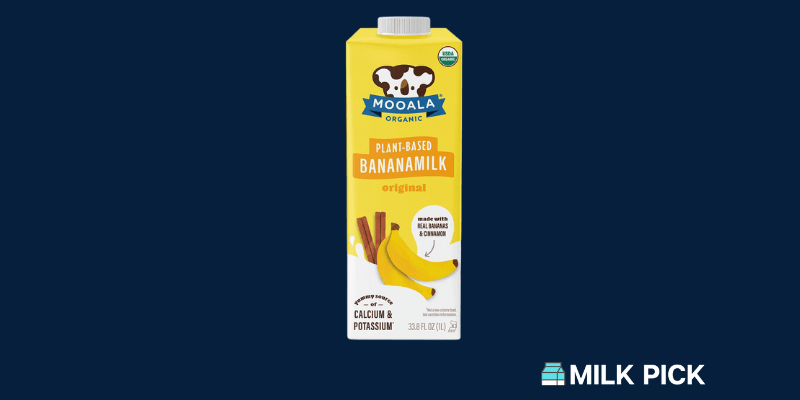
Calcium:
300mg (25% DV)
Ingredients:
Filtered Water, Organic Bananas, Organic Sunflower Seeds, Less Than 2%: Calcium and Potassium Blend (Calcium Carbonate, Potassium Chloride), Gellan Gum, Organic Cinnamon
4. Mooala Unsweetened Almondmilk
The final product on our list from Mooala, is their almond milk. The ingredient list s very similar to banana and oat milk. However, it does contain less calcium, with 10% of the recommended daily value.
Still, this is the better option of the two almond milk brands on our list. Most fortified almond milk contains pretty terrible ingredients, which makes Mooala Almondmilk all the more special. If you want almond milk with calcium, but you don’t want to make your own, this is the best option we’ve found.
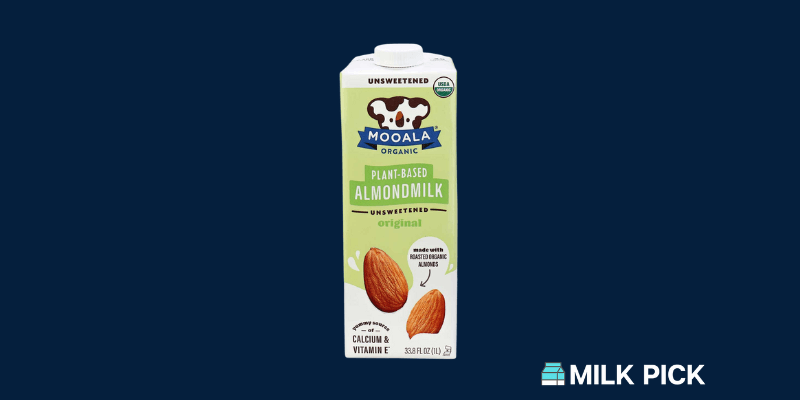
Calcium:
150mg (10% DV)
Ingredients:
Filtered Water, Organic Almonds Less Than 2%: Calcium (Calcium Carbonate), Sea Salt, Gellan Gum
5. Pacific Foods Organic Original Oat Milk
If you want an alternative oat milk option, Pacific Foods isn’t a bad choice.
Unlike some of their other plant-based beverages, the oat milk doesn’t contain natural flavors. However, it does contain gellan gum. And as I mentioned earlier, that’s pretty standard among plant-based milk.
With 10% of the daily recommended value of calcium, it’s on the lower end of the oat milk options on our list. But on the positive side, it’s easier to find in stores than most of the other brands.
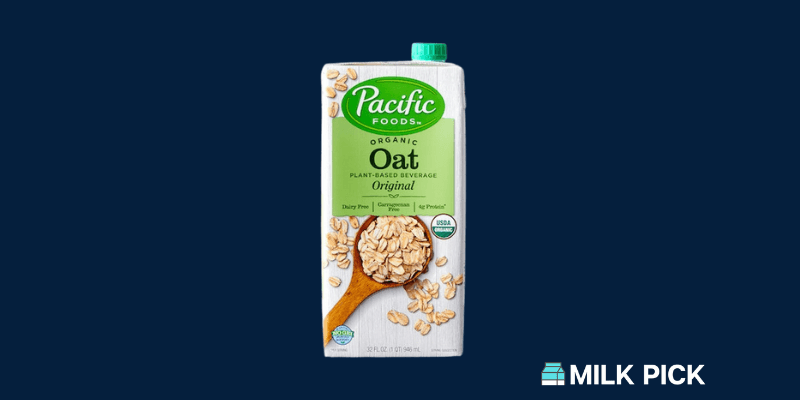
Calcium:
121mg (10% DV)
Ingredients:
Water, Organic Oats, Organic Oat Bran, Contains 1% or Less Of: Gellan Gum, Sea Salt, Tricalcium Phosphate, Vitamin D2
6. Pacific Foods Hemp Original
Hemp milk doesn’t get mentioned as much as almond and oat milk, but it is slowly becoming more popular. Pacific Foods is one of the few major brands that make hemp milk, so it can be difficult to find.
This hemp milk contains 20% of the daily recommended value of calcium, as well as 10% of the recommended daily value of vitamin D.
The downside is it has a couple of extra ingredients we don’t generally recommend—disodium phosphate and xantham gum.
Disodium phosphate is an additive that’s used as an emulsifier to give hemp milk a creamier texture and extend its shelf life. While it’s FDA-approved and generally considered safe, we prefer milk without any additives when possible.
Xanthan gum is another additive used as a thickener and stabilizer in plant-based milk. Xanthan gum is a very common ingredient, but we’d prefer if it wasn’t in this milk.
However, we understand it’s most likely used to thicken up hemp milk.
We also don't like the inclusion of brown rice syrup.
The primary reason we’ve included Pacific Foods Hemp Original on our list is it’s one option that’s free of most major food allergens.
That makes it suitable for people with gluten, soy, and nut allergens. So if you can’t have some of the other milk on our list, hemp milk could be a good option.
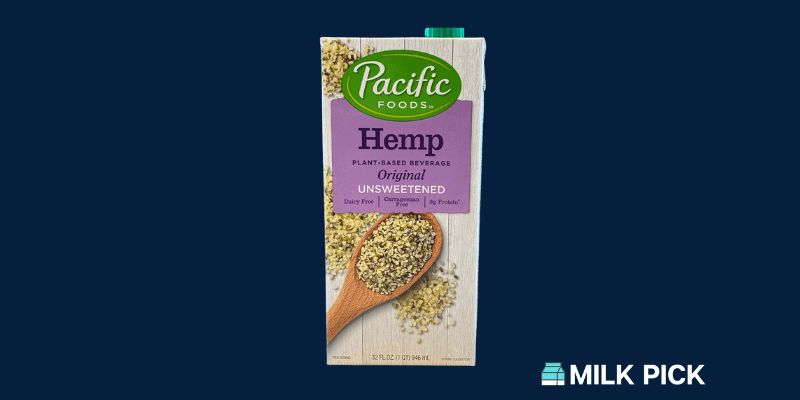
Calcium:
263mg (20%)
Ingredients:
Water, Brown Rice Syrup, Hulled Hemp Seed, Contains 1% or Less Of: Disodium Phosphate, Tricalcium Phosphate, Vitamin D2, Xanthan Gum
7. Oatsome
Oatsome is another popular oat milk brand with decent ingredients for fortified milk. It contains 20% of the recommended daily value of calcium.
But on top of that, it contains high levels of Vitamin B12 and riboflavin. B12 is great for brain health, your nervous system, and other bodily functions.
Riboflavin is another B vitamin (B2) that helps your body turn protein, fats, and carbs into energy, amongst other things.
The downside of Oatsome is it contains sunflower oil, which may have some adverse effects.
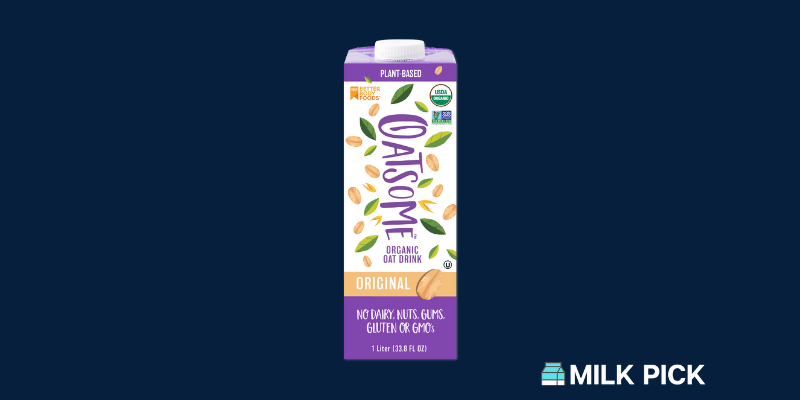
Calcium:
289mg (20%)
Ingredients:
Oatmilk (Water, Organic Gluten-Free Oats), Organic Sunflower Oil, Sea Salt, Calcium Carbonate, Riboflavin, Vitamin D, Vitamin B12
Make Your Own Calcium Fortified Milk
If none of the options above work for you, consider making your own plant-based milk and adding calcium. It’s not as difficult as you might think, and it’s the best way to guarantee you get all the nutrients you want.
Plus, it can be a more affordable option.
This article from Grocery Shrink has a step-by-step guide. All you need is:
- Almonds
- Water
- Supplements (they use calcium tablets)
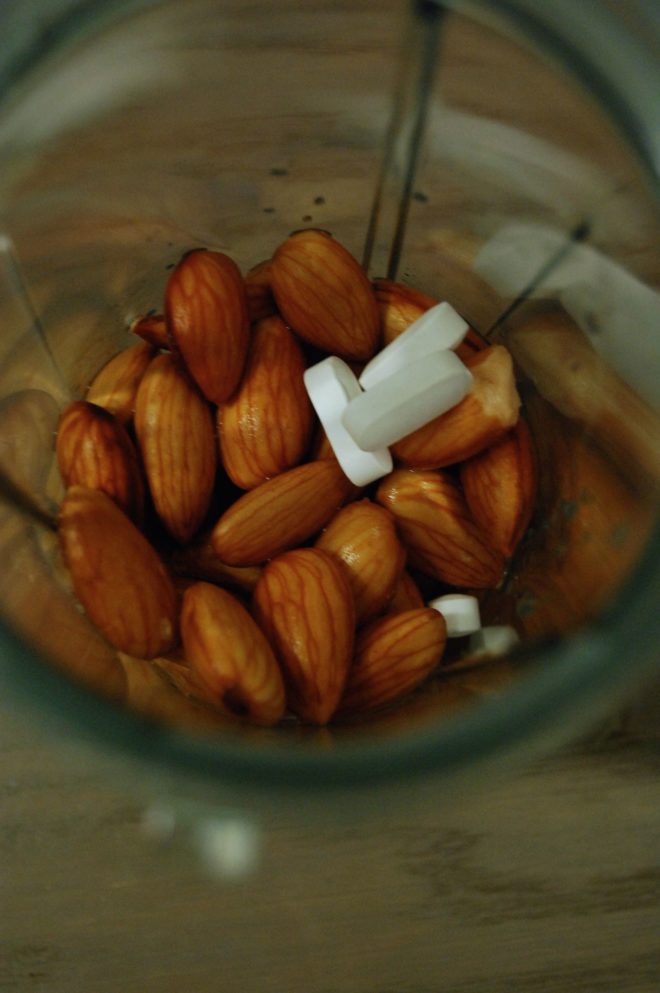
Combine the ingredients in a blender.
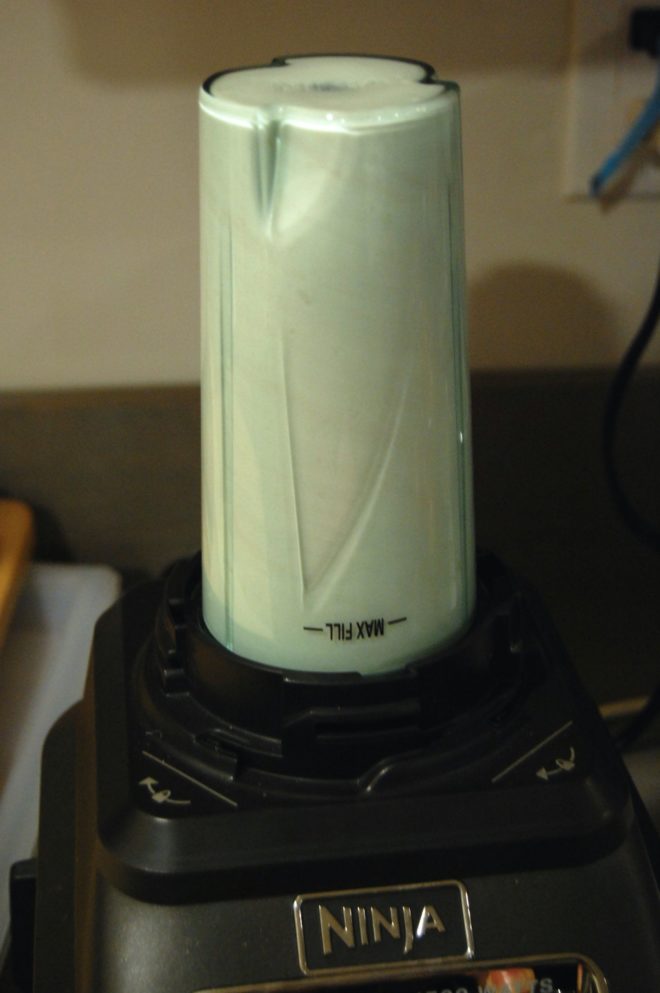
Once it’s blended, they strain it through a nut bag.
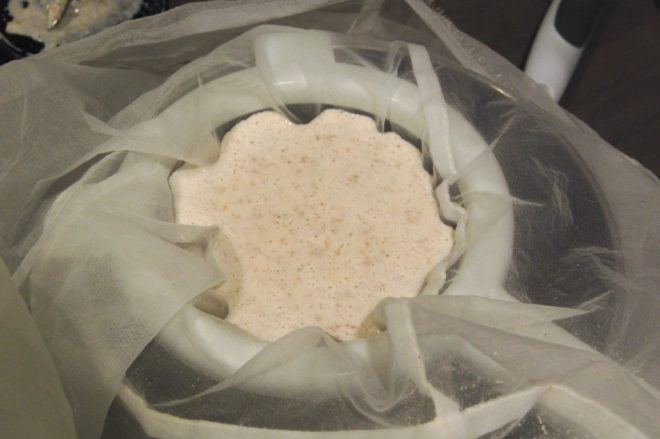
Then just pour the strained milk into your container.
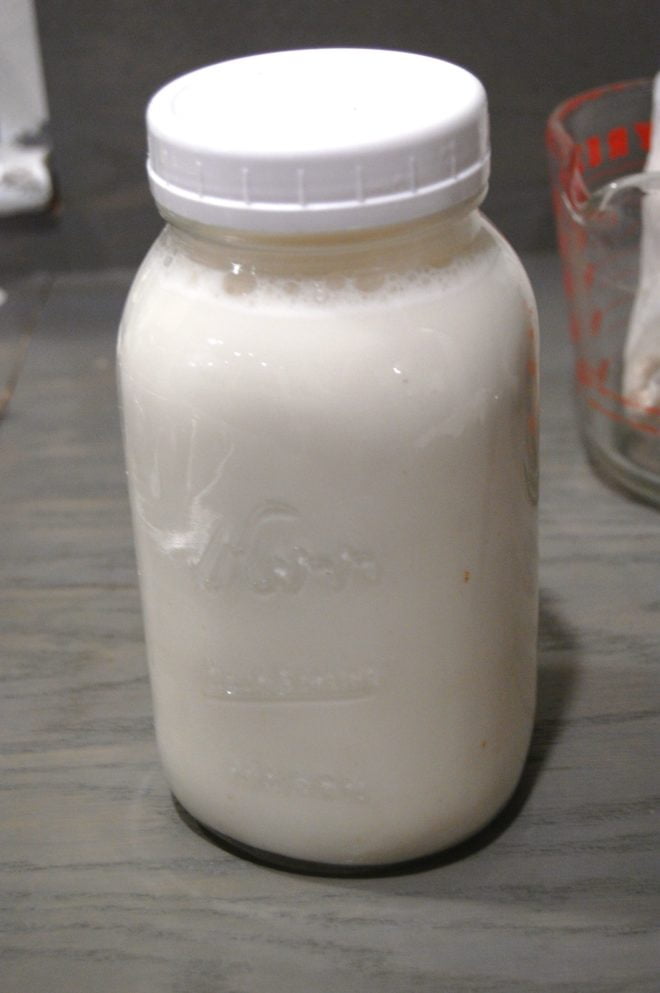
Simple!
Check out their article for the full ingredient list and portions.
Why Calcium is Important
Calcium is an essential mineral that plays a vital role in human health.
It's necessary for the development and maintenance of strong bones and teeth, and it plays a role in muscle contraction, nervous functioning, and blood clotting.
As we age, our bodies need more calcium to maintain healthy bone and bodily functions.
Without the proper amount of calcium in your diet, your bones may become weak and porous, your teeth may begin to decay, and you could suffer widespread cramps and numbness throughout your hands and feet.
Fortunately, it's possible to get calcium from a range of foods including:
- Leafy-green vegetables
- Cheese
- Yogurt
- Tofu
- Broccoli
- Almonds
- Sesame seeds
- Figs
- White beans
For a long time, though, a lot of people got the majority of their calcium from cow’s milk.
But with more people reducing or completely eliminating dairy milk from their diet, what options are available?
If you are lactose intolerant, allergic to dairy, or follow a vegan diet, you can still get calcium from fortified foods and supplements.
For this reason, the non-dairy milk industry has exploded and now offers many varieties of nut, oat, and bean-based milk.
Related: Is Almond Milk Good For Your Bones?
Ingredients to Look Out For
As you start shopping for plant-based milk, always check the ingredients and nutritional facts.
Every brand uses a different formulation and may fortify its products with added nutrients.
Most importantly, though, make sure that the product you're drinking is free of unhealthy additives or the following ingredients:
Carrageenan
Carrageenan is a polysaccharide extracted from edible red seaweeds.
It is widely used in the food industry as a thickening, stabilizing, and gelling agent.
Carrageenan is indigestible, so it passes through the digestive tract unchanged.
Some people may be sensitive to carrageenan and may experience digestive discomfort after consuming products that contain it.
Also, some studies have even linked it to inflammation and colon cancer.
Added Oils
Many plant-based milks contain added oils to help create a smooth, creamy texture.
The majority of these oils are highly processed and full of saturated fats, though.
If you’re drinking plant-based milks for health reasons, the added oils may be counterintuitive.
Natural Flavors
Most manufactured foods contain natural flavorings, but there’s little information about what these ingredients are.
Every company uses its own unique blend, some of which are vegan and some of which are not.
If you’re consuming plant-based milk because you’re following a vegan diet, be careful drinking products with natural flavorings because they may contain animal-based products.
These ingredients should be clearly labeled on the back of the milk carton.
Many brands even label whether they are vegan-friendly, so you shouldn’t worry too much about consuming something animal-based without knowing.
You Can Get Calcium From Plant-Based Milk!
Milk is an excellent source of the nutrients we need to survive, yet not everyone can or wants to consume dairy.
For those who can't drink cows’ milk, we recommend trying one of the brands from our list.
